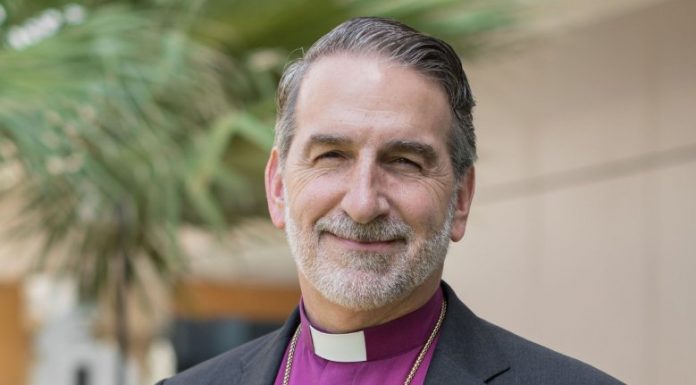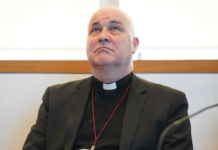Greetings in the Name of Our Lord and Savior Jesus Christ!
As I write to you, my brothers and sisters, it is the fall season here in North America. Like you, we are being challenged by the onslaught of the pandemic, but we have not lost hope and we are confident in the faithfulness of the Lord that He will never leave us or forsake us (Hebrews 10:35), and that nothing can separate us from the love of God in Christ Jesus our Lord (Romans 8:38-39). Please continue to pray for the Lord to relieve the world of this pandemic, guide the medical and health officials and the politicians in their decisions, and bring healing to those who have the coronavirus.
As you may already know, our General Secretary, Archbishop Ben Kwashi is undergoing treatment for cancer. He is positive and upbeat. Please continue to pray for healing for Archbishop Ben and for Gloria as they face this serious challenge.
In the West we have seen in the past 60 years a shift from modernity to post-modernity which has brought a staggering sea-change in the popular conception of truth, and this has had a dramatic impact on our societies. As Pilate asked Jesus before he was crucified: “What is truth?” It now seems that anything can answer this question in the West. Jesus said, “I am the way, the TRUTH, and the life” (John 14.6). Today’s post-modern prophets say, “He could be a way, he could possibly have a truth, and everyone needs to discover in their own life what life means for them.” As a result, the Church in the West and Western Anglicanism have declined and decayed away from Biblical Truth and the authority of Scripture. Fortunately, this has not yet totally infected the Global South and the East, but this philosophy is on the move!
The witness of the earliest Christians was a message embodied in an immovable faith and moral ethic. The early Church inhabited a world with many false gods, societal ills, and oppressive rulers. Those early followers of Jesus stood before Caesars, centurions, and persecutions and said, “Salvation is found in no one else, for there is no other name under heaven given to mankind by which we must be saved” (Acts 4.12). Facing torture, death, or forced poverty, they refused to deny Jesus and his teaching regarding faithfulness to God and holiness of life. They preached with a boldness about a transcendence above the contemporary ideologies with earthly and eternal consequences. Historian Rodney Stark has catalogued the ways those early followers of Jesus overcame the Roman Empire:
(1) The early church had an extreme compassion for those in need. They out-loved the cultural ideologies of their day;
(2) The early church had an extreme commitment to truth (embodied in the person of Jesus Christ as well as the Scriptures) so they out-thought, they out-reasoned, and they out-taught the prevailing systems of their day;
(3) The early church gave us a comprehensive system for human flourishing. They explained the purpose of life, the sanctity of Life, the goal of human life, and the value of all human life. They out-lived the decadent and decaying Roman culture of their times.
Today’s Western Anglican crisis of faith is also a societal crisis of faith. What is truth? What matters? Who is God? How do we know him, love him, and walk rightly with him? How do we respond to the ungodliness, immorality, and insidious duplicity going on around us?
While the Anglican Establishment of the West would call us to “get along” and have “good disagreement,” even over basic matters of the faith, the Scriptures call us to uphold truth on all matters pertaining to salvation. Our forefathers and mothers in the faith have left us incredible examples of their unwillingness to sacrifice the teaching of the Bible by replacing it with the latest politically correct social or intellectual determination in faith and morals.
Have you noticed that there is a radical difference between Philippians 1 and Galatians 1? In Philippians 1, the Apostle Paul both laments and celebrates the competitive and rivalrous forms of preaching the Gospel to unbelievers. He says, “It is true that some preach Christ out of envy and rivalry, but others out of goodwill. The latter do so out of love, knowing that I am put here for the defense of the gospel. The former preach Christ out of selfish ambition, not sincerely, supposing that they can stir up trouble for me while I am in chains. But what does it matter? The important thing is that in every way, whether from false motives or true, Christ is preached. And because of this I rejoice” (Philippians 1:15-18).
In contrast in Galatians 1, Paul is confronting false teaching about the Gospel by those who say they believe it. He says, “I am astonished that you are so quickly deserting the one who called you to live in the grace of Christ and are turning to a different gospel— which is really no gospel at all. Evidently some people are throwing you into confusion and are trying to pervert the gospel of Christ. But even if we or an angel from heaven should preach a gospel other than the one we preached to you, let them be under God’s curse! As we have already said, so now I say again: If anybody is preaching to you a gospel other than what you accepted, let them be under God’s curse!”
Paul’s litmus test for the faith wasn’t good disagreement or getting along, but rather truth. Even when that truth was preached out of mixed motives, the truth is what mattered. Speak the truth in love, (Ephesians 4:15). But preaching the truth is preaching it without compromise. A different Gospel is no gospel at all. Again, the Scriptures are very clear: “Dear friends, although I was very eager to write to you about the salvation we share, I felt compelled to write and urge you to contend for the faith that was once for all entrusted to God’s holy people. For certain individuals whose condemnation was written about long ago have secretly slipped in among you. They are ungodly people, who pervert the grace of our God into a license for immorality and deny Jesus Christ our only Sovereign and Lord” (Jude 3-4).
The witness we see in the Scriptures and in church history is that truth produces unity and freedom to love. The clarity of truth is powerful. That truth was revealed in the person and teaching of Jesus Christ. And that truth sets us all free to serve the Kingdom of God and the people of this world.
Please pray for our GAFCON leaders as we seek to uphold the truth in the Anglican Communion, defend unity, and share the Gospel to those who don’t know about Jesus.
In Christ Jesus,
Archbishop Foley
The Most Rev’d Dr. Foley Beach
Chairman, Gafcon Primates Council



